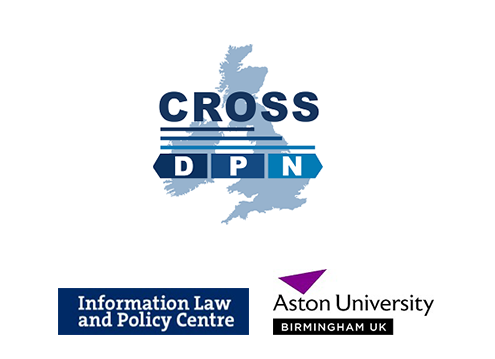Commercial data transfers between
UK and EU and the adequacy decision

The event is a part of the Cross-border Data Protection Network (Cross-DPN) project, funded by the Economic and Social Research Council and the Irish Research Council. CROSS-DPN is a multi-stakeholder, transnational forum between the United Kingdom and the Republic of Ireland for discussing issues related to data protection in the post-Brexit era through an interdisciplinary research, as well as a practical and policy lens.
The event is co-organised by Dr Edina Harbinja (Aston University) and Dr Nóra Ní Loideain (Information Law and Policy Centre), and it will focus on issues surrounding commercial data transfers between the UK and the Republic of Ireland (and the EU more widely) in the post-Brexit era.
Date
22 April 2021, 10am – 2.30pm
Institute
Institute of Advanced Legal Studies
Venue
Online Workshop (Zoom)
Academic Panel
chaired by Dr Edina Harbinja
10am – 12pm (BST)
In this session, leading academics will share their perspectives on commercial data transfer issues.

Dr Karen Mc Cullagh
University of East Anglia
‘Post-Brexit Data Protection in the UK – Leaving the EU but not EU data protection law behind’
Dr Karen Mc Cullagh is a non-practising Solicitor, having qualified and practised Law in Northern Ireland before entering academia. Whilst undertaking postgraduate studies, Karen held a Lectureship at the University of Salford and was employed as a Teaching Assistant at the University of Manchester and a Research Assistant at Queen’s University, Belfast.
Karen holds both a PhD and an MSc in Social Research Methods & Statistics from the University of Manchester. She also holds an LLM in Computers & Law, an LLB (Hons) in Law and PG Cert. in Professional Legal Studies (Solicitor) from Queen’s University, Belfast.
Karen’s research specialism is information rights: both the commercial and fundamental rights aspects of privacy and data protection and Freedom of Information, as an aspect of public law.
Karen won a UEA Students’ Union Transforming Education Award (Advisor of the Year) in 2017-18, received a UEA Award for Excellence in Teaching in 2012-2013, and was recognised as a UEA Media Star 2017-18.
Twitter:@karenmccullagh

Dr Henry Pearce
University of Portsmouth
‘Data protection law in a post-Brexit world: The future is not “personal”?’
Dr Henry Pearce is a senior lecturer in law at the University of Portsmouth and deputy editor for Computer Law & Security Review (CLSR), a major platform for the publication of high-quality research and legal analysis in the field of IT law and computer security. His research primarily focuses on the development of data protection law and policy, both nationally and internationally, and he is widely published in the field. His recent work has focused particularly on the regulation of posthumous medical data donation (PMDD), data licensing, the data disclosure practices of public authorities, and the interplay between data protection law and other areas of law, such as administrative law and freedom of information law.

Dr Michael Veale
UCL
‘Beyond Adequacy: Data Flows’ Infrastructural Turn’
Dr Michael Veale is Lecturer in Digital Rights and Regulation at the Faculty of Laws, UCL. He specialises in the intersection of law and policy and emerging digital technologies and infrastructures. He has authored and co-authored reports for a wide range of organisations, including the Law Society of England and Wales, the Royal Society, the British Academy, and the Commonwealth Secretariat. Dr Veale sits on the advisory councils to the digital rights organisations Foxglove and the Open Rights Group, and the Ada Lovelace Instiute’s Rethinking Data group. He was previously Digital Charter Fellow at the Turing Institute and DCMS.

Prof Daithí Mac Síthigh
Queen’s University Belfast
‘Never mind the new oil, is there mud on the wheels? The information industries after Brexit’
Daithí Mac Síthigh is Professor of Law and Innovation at Queen’s University Belfast. His areas of expertise include law and technology, audiovisual media law, copyright and the creative industries, the ‘sharing economy’, and open data. He was awarded an Eisenhower Fellowship in 2019, and was for five years a member of the Irish government’s Open Data Governance Board. He is a co-director of the creative industries R&D partnership ‘Future Screens NI’ (funded by the AHRC) and was a co-investigator at CREATe, the RCUK centre for copyright and new business models in the creative industries. He is the programme convenor of the QUB LLM in Law and Technology, and teaches Regulating Innovation, Regulating Digital Communications, and Media and Information Law.
Daithí’s research has been published in various journals, including Legal Studies, Journal of Media Law, Communications Law, and the International Journal of Law and Information Technology; recent work includes a study of ranking and reputation systems (co-authored with Mathias Siems, in the Modern Law Review 2019), an article on intermediary liability and responsibilities, published in Information and Communications Technology Law 2020, and a book chapter on personalisation and ‘smart cities’, forthcoming in a Cambridge University Press collection edited by Jacob Eisler and Uta Kohl. He is co-editor of Executive decision-making and the courts: revising the origins of modern judicial review (Hart, 2021) and is co-editing a book for Oxford University Press (with David Mangan and Catherine Easton) on the philosophical foundations of cyberlaw.

Dr Edina Harbinja
Aston University
Dr Edina Harbinja is a Senior Lecturer in Media/Privacy Law. Her principal areas of research and teaching are related to the legal issues surrounding the Internet and emerging technologies. Edina is a pioneer and a recognised expert in post-mortem privacy, i.e. privacy of the deceased individuals. She has published widely on aspects of internet law and regulation and has been a visiting scholar and an invited speaker to universities and conferences in the USA, Latin America and Europe. Her research has been highly impactful. She has been able to influence and inform American, the UK and Australian legislators and court cases over the past 5 years, as well as big tech companies, the legal profession and civil society. Her public engagement has been very extensive. She has published pieces in news outlets, websites, practitioners’ magazines etc. (e.g. BBC Tomorrow’s World, BBC Ideas, The Nature Outlook, The Guardian, The Verge, The Daily Mail, The Conversation, The Law Society Gazette, The Legal Practice Management Magazine etc.).
Edina holds a number of appointments and memberships outside Aston. This includes, inter alia, membership of the Advisory Council at Open Rights Group, Senior Fellowship of the Higher Education Academy, membership of the Executive Committee, British and Irish Law, Education and Technology Association (BILETA). Edina is also an alumna of the Leadership Foundation’s Aurora programme and the UK Digital Economy Ambassador, as a part of the CHERISH-DE Digital Economy Crucible Programme, Swansea University.
Edina is a chief editor for the EUP book series ‘Future law’, along with Prof Lilian Edwards and Prof Burkhard Schafer, and she has guest edited tech law journals as well. She is also a peer reviewer for a number of journals in the area of IT and law and has reviewed research proposals, book proposals and monographs. Edina has led small grant applications as a PI, and have so far been successful at two important awards.
Edina’s research interests are in the area of privacy and data protection, post-mortem privacy, digital regulation, digital property and AI.
Find her on Twitter at @EdinaRl.
The afternoon panel will be interactive, responding to the academic panel. It will consider legal, policy, industry and civil society perspectives. Panellists include representatives of the Irish Data Protection Commission, Open Rights Group, the Irish Council for Civil Liberties, legal professions, UK regulators, tech industry.

Bojana Bellamy
President of Hunton Andrews Kurth LLP’s Centre for Information Policy Leadership (CIPL)
Bojana is the President of Hunton Andrews Kurth LLP’s Centre for Information Policy Leadership (CIPL), a preeminent global information policy think tank located in Washington, DC, London and Brussels. With more than 20 years of experience and deep knowledge of global data privacy and cybersecurity law, compliance and policy, she has a proven industry record in designing strategy, and building and managing data privacy compliance programs. Bojana was one of 20 privacy experts to participate in the transatlantic “Privacy Bridge Project” from 2014 – 2015 that sought to develop practical solutions to bridge the gap between European and US privacy regimes. Bojana was also the recipient of the 2019 International Association of Privacy Professionals (IAPP) Vanguard Award, which recognizes privacy professionals for outstanding leadership, knowledge and creativity in the field of privacy and data protection.
Currently, Bojana sits on the Internet Commission Advisory Board, the OECD’s Privacy Guidelines Expert Group and the Thomson Reuters’ Practical Law Data Protection Consultation Board, as well as the Advisory Board of the Tech, Law and Security Program (TLS) at the American University Washington College of Law. She participates in many industry groups and is a regular speaker at international privacy and data security conferences.
Prior to joining CIPL, Bojana served for 12 years as the Global Director of Data Privacy at Accenture, and worked for eight years as Principal Consultant with Privacy Laws & Business.

Heather Burns
Policy Manager at Open Rights Group
Heather Burns is Policy Manager at Open Rights Group, the UK’s largest grassroots digital rights organisation. She leads ORG’s political engagement portfolio on freedom of expression, surveillance, and encryption. She also monitors post-Brexit data protection issues in the international context, including their implications for devolution and the Irish border. Based in Glasgow, Heather looks forward to resuming the 23-minute flight to Belfast craic soon.

Neil Brown
Solicitor and Managing Director at decoded.legal
Neil is a solicitor and the managing director of English law firm decoded.legal. He is good at advising Internet, telecoms, and technology businesses, but bad at writing bios.

Nicola Coogan
Assistant Commissioner in the Data Protection Commission (DPC) heading up the International Transfers unit
Nicola Coogan is an Assistant Commissioner in the Data Protection Commission (DPC) heading up the International Transfers unit. This area of responsibility includes approval of Binding Corporate Rules applications from multinational organisations, provision of advice and guidance to companies and public sector bodies on data transfers and representing DPC at meetings of the International Transfers subgroup and other meetings of the European Data Protection Board where all EEA DPAs work collectively on guidance and data transfers issues generally. At EDPB level Nicola has worked on Brexit Guidance on transfers, the FAQ’s following the Judgment of the European Court of Justice on the Data Protection Commissioner v Facebook Ireland Limited, Maximillian Schrems Case and is a member of the EDPB Task Force working on the recommendations on Supplementary Measures arising out of the Judgment.

Oliver Patel
Head of Inbound Data Flows, Data Policy Directorate, DCMS
Oliver Patel is Head of Inbound Data Flows at the UK Government’s Department for Digital, Culture, Media and Sport (DCMS). He is leading work on securing data adequacy decisions from the EU. He also leads the inbound data flows function, which aims to remove unnecessary barriers to data flows into the UK from countries worldwide. Oliver previously worked as Head of Public Policy at University College London’s European Institute, where he undertook academic research and policy engagement on Brexit, digital policy and cross-border data flows. Prior to this, Oliver worked at Nesta, the innovation foundation, and in the House of Commons.

Dr Johnny Ryan
Irish Council for Civil Liberties
Dr Johnny Ryan FRHistS is a Senior Fellow at the Irish Council for Civil Liberties, and a Senior Fellow at the Open Markets Institute. He is focused on surveillance, data rights, competition/anti-trust, and privacy.
He is former Chief Policy & Industry Relations Officer at Brave, the private web browser. Dr Ryan led Brave’s campaign for GDPR enforcement, and liaised with government and industry colleagues globally. His regulatory interventions and expert commentary has appeared in media such as The New York Times, The Economist, Wired, Le Monde, and the front page of The Financial Times. Protocol published a profile about some of his work.
Previously, Dr. Ryan worked in adtech, media, and policy. His previous roles included Chief Innovation Officer of The Irish Times and Senior Researcher at the Institute of International & European Affairs (IIEA).
Dr Ryan is a regular speaker at high level industry fora, and has testified at the United States Senate and the European Commission.
As an O’Reilly Foundation PhD scholar at the University of Cambridge he studied the spread of militant memes. Dr Ryan is the author of two books (link: “A History of the Internet and the Digital Future”). His first book, based on his work at the IIEA, was the most cited source in the European Commission’s impact assessment that decided against pursuing Web censorship across the EU.
He is a Fellow of the Royal Historical Society, and a member of the World Economic Forum’s expert network on media, entertainment and information.
He started his career in design, and returned to design thinking later as Executive Director of The Innovation Academy at University College Dublin. He was an associate on the emerging digital environment at the Judge Business School of the University of Cambridge.

Eduardo Ustaran
Partner, Hogan Lovells International LLP
Global co-head of the Hogan Lovells Privacy and Cybersecurity practice, Eduardo Ustaran is widely recognized as one of the world’s leading privacy and data protection lawyers and thought leaders. With over two decades of experience, Eduardo advises multinationals and governments around the world on the adoption of privacy and cybersecurity strategies and policies. Eduardo has been involved in the development of the EU data protection framework and was listed by Politico as the most prepared individual in its ‘GDPR power matrix’.
Based in London, Eduardo leads a highly dedicated team advising on all aspects of data protection law – from strategic issues related to the latest technological developments such as artificial intelligence and connected devices to the implementation of global privacy compliance programs and mechanisms to legitimize international data flows.
Eduardo is the author of The Future of Privacy (DataGuidance, 2013), a ground-breaking book where
Eduardo is co-founder and editor of Data Protection Leader, a member of the panel of professionals of

Dr Nóra Ní Loideáin
Director and Lecturer in Law, Information Law & Policy Centre Institute of Advanced Legal Studies, University of London
Dr Nóra Ní Loideáin is Director and Lecturer in Law of the Information Law & Policy Centre, Institute of Advanced Legal Studies, University of London. Her research and publications focus on human rights and technology, particularly within the contexts of law enforcement and national security in EU and ECHR law, and AI and gender.
She is a member of the UK Home Office Biometrics and Forensics Ethics Group (BFEG), a trustee on the Board of the British and Irish Legal Information Institute (BAILII), and an editor of International Data Privacy Law (Oxford University Press). Prior to her academic career, Nóra was a Legal and Policy Officer for the Office of the Director of Public Prosecutions of Ireland and clerked for the Irish Supreme Court.
Nóra’s work in the fields of EU law and European human rights law, has been cited and published by Science, The Guardian, BBC, the United Nations, and the UK House of Lords in its recent report on Beyond Brexit: policing, law enforcement and security.
Funded by:

